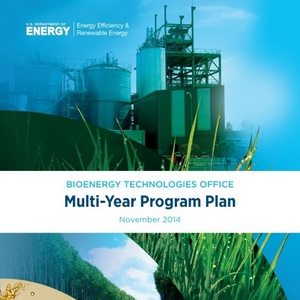DOE's Bioenergy Technologies Office updates program plan

U.S. Department of Energy
December 22, 2014
BY Erin Krueger
The U.S. Department of Energy’s Bioenergy Technologies Office recently released an updated multi-year program plan (MYPP), which sets for goals and structure for the office over the next five years. The MYPP is intended for use as an operational guide to help the Biotechnologies Office manage and coordinate it activities. The document is also a resource to help communicate the office’s mission and goals to stakeholders and the public.
Within the 223-page report, the Bioenergy Technologies Office highlights its technology research, development, demonstration and deployment plans for feedstock supply, logistics and development for both terrestrial and algae feedstocks. Under conversion research and development, the DOE describes initiatives for research and development of biochemical conversion technologies and thermochemical conversion technologies. The MYPP also addresses issues related to demonstration and deployment, sustainability, strategic analysis and strategic communications, as well as the office portfolio management process and performance assessments.
Within the document, the Bioenergy Technologies Office indicates that while its overall mission is focused on developing advanced technologies for the production of fuels, products and power from biomass, the office’s near-term goals are focused on the conversion of biomass into liquid transportation fuels and on bioproducts and biopower that enable renewable fuels production.
“Historically, the office’s focus has been on RDD&D for ethanol production from lignocellulosic biomass,” said the DOE in the MYPP. “With achievement of the cellulosic ethanol cost targets, the office has shifted toward developing other advanced biofuels that will contribute to the renewable fuel standard (RFS) volumetric requirements. By focusing on these biomass-based hydrocarbon fuels (renewable gasoline, diesel, and jet fuel) and hydrocarbons from algae, the office seeks to engage the refinery industry in developing solutions, while utilizing existing infrastructure as much as possible.
Advertisement
Advertisement
A full copy of the MYPP can be downloaded from the DOE’s Bioenergy Technologies Office website.
Advertisement
Advertisement
Related Stories
The U.S. EPA on July 8 hosted virtual public hearing to gather input on the agency’s recently released proposed rule to set 2026 and 2027 RFS RVOs. Members of the biofuel industry were among those to offer testimony during the event.
The USDA’s Risk Management Agency is implementing multiple changes to the Camelina pilot insurance program for the 2026 and succeeding crop years. The changes will expand coverage options and provide greater flexibility for producers.
President Trump on July 4 signed the “One Big Beautiful Bill Act.” The legislation extends and updates the 45Z credit and revives a tax credit benefiting small biodiesel producers but repeals several other bioenergy-related tax incentives.
CARB on June 27 announced amendments to the state’s LCFS regulations will take effect beginning on July 1. The amended regulations were approved by the agency in November 2024, but implementation was delayed due to regulatory clarity issues.
SAF Magazine and the Commercial Aviation Alternative Fuels Initiative announced the preliminary agenda for the North American SAF Conference and Expo, being held Sept. 22-24 at the Minneapolis Convention Center in Minneapolis, Minnesota.
Upcoming Events










